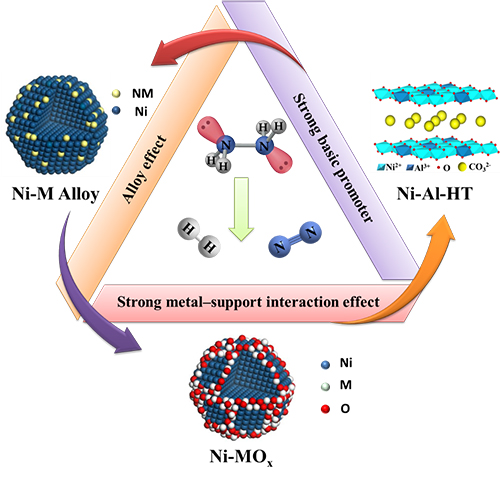A research group led by Prof. HUANG Yanqiang and Prof. ZHANG Tao was invited to publish a review paper entitled "Design strategies of highly selective nickel catalysts for H2 production via hydrous hydrazine decomposition" in National Science Review.

The strategies of designing efficient Ni-based catalysts for hydrazine decomposition. (Image by LIANG Binglian)
Hydrazine (N2H4) is one of the most important liquid propellants, which can be easily decomposed to gases of high temperature and high pressure with the help of the catalysts at ambient temperature. The scientists have devoted to the fundamental and applied research in the N2H4 decomposition for a long time, focusing on the development of effective catalysts for application in different fields.
The modulation of the N2H4 decomposition to obtain hydrogen (H2) and (N2) with high selectivity has been the focus of attention in academia, which lies on the accurate controlling of breakage ability in N-N and N-H bonds, and their sequence through optimal design of catalysts.
The review briefly summarized the research progress on the modulation strategy of Ni-based catalysts in the activity and selectivity of N2H4 decomposition mainly from ZHANG and HUANG's group. They investigated the basic promoter effect (Angew. Chem. Int. Ed., AIChE J.), alloy effect (Appl. Catal. B, J. Catal.) and strong metal-support interaction effect (ACS Catal.) in a series of different supported Ni-based catalysts, to achieve high activity and selectivity in N2H4 decomposition to H2.
These studies further provide a deep understanding in the mechanism of N2H4 decomposition, which could lay an important foundation for the application of N2H4 decomposition catalysts in certain key fields.
This work was supported by the Natural Science Foundation of China, and the Chinese Academy of Sciences. (Text by LIANG Binglian)